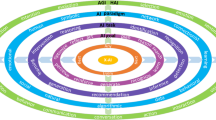Abstract
In recent years, AI based on deep learning has achieved tremendous success in specialized tasks such as speech recognition, machine translation, and the detection of tumors in medical images. Despite these successes there are also some clear signs of the limitations of the current state-of-the-art in AI. For example, biases in AI-enabled face recognition and predictive policing have shown that prejudice in AI systems is a real problem that must be solved. In this position paper, we argue that current AI needs to be developed along four dimensions to become more generally applicable and trustworthy: environment, purpose, collaboration, and governance. Hybrid AI offers the potential for advancements along these four dimensions by combining two different paradigms in AI: knowledge-based reasoning and optimization, and data-driven machine learning.
Access this chapter
Tax calculation will be finalised at checkout
Purchases are for personal use only
Similar content being viewed by others
References
Grother, P., Ngan, M., Hanaoka, K.: Face Recognition Vendor Test (FRVT) Part 3: Demographic Effects, NISTIR 8280. NIST (2019)
Hunt, M.: Automated welfare fraud detection system contravenes international law. Dutch court rules, Global Government Forum (2020). https://www.globalgovernmentforum.com/
Banerjee, S., Jha, S., Cyriac, J., Kalbarczyk, Z., Iyer, R.: Hands off the wheel in autonomous vehicles? A systems perspective on over a million miles of field data. In: Proceedings 48th Annual IEEE/IFIP International Conference on Dependable Systems and Networks (DSN), Luxembourg City, pp. 586–597 (2018)
Povolny S., Trivedi, S.: Model Hacking ADAS to Pave Safer Roads for Autonomous Vehicles. https://www.mcafee.com/blogs/other-blogs/mcafee-labs/model-hacking-adas-to-pave-safer-roads-for-autonomous-vehicles/. Accessed 23 Nov 2020
Lake, B., Ullman, T., Tenenbaum, J., Gershman, S.: Building machines that learn and think like people. Behav. Brain Sci. 40, E253 (2016)
McKinney, S., Sieniek, M., Godbole, V., Godwin, J., Antropova, N., et al.: International evaluation of an AI system for breast cancer screening. Nature 577, 89–94 (2020)
Raghu, M., Zhang, C., Brain, G., Kleinberg, J., Bengio, S.: Transfusion: understanding transfer learning for medical imaging. In: Advances in Neural Information Processing Systems, vol. 32 (2019)
Weiss, K., Khoshgoftaar, T.M., Wang, D.: A survey of transfer learning. J. Big Data 3(1), 1–40 (2016). https://doi.org/10.1186/s40537-016-0043-6
Werkhoven, P., Kester, L., Neerincx, M.: Telling autonomous systems what to do. In: Proceedings of the 36th European Conference on Cognitive Ergonomics, New York, NY (2018)
Elands, P., Huizing, A., Kester, L., Peeters, M., Oggero, S.: Governing ethical and effective behaviour of intelligent systems. Militaire Spectator 188(6), 303–313 (2019)
van Diggelen, J., Neerincx, M., Peeters, M., Schraagen, J.: Developing effective and resilient human-agent teamwork using team design patterns. IEEE Intell. Syst. 34(2), 15–24, (2019)
Neerincx, M., et al.: Socio-cognitive engineering of a robotic partner for child’s diabetes self-management. In: Front. Robot. AI 6,118 (2019)
Adadi, A., Berrada, M.: Peeking inside the black-box: a survey on explainable artificial intelligence (XAI). IEEE Access 6, 52138–52160 (2018)
van der Aalst, W.M.P., Bichler, M., Heinzl, A.: Responsible data science. Bus. Inf. Syst. Eng. 59(5), 311–313 (2017). https://doi.org/10.1007/s12599-017-0487-z
Islam, S., Eberle, W., Ghafoor, S., Siraj, A., Rogers, M.: Domain knowledge aided explainable artificial intelligence for intrusion detection and response. In: AAAI Spring Symposium: Combining Machine Learning with Knowledge Engineering (2020)
Simonite, T.: When It Comes to Gorillas, Google Photos Remains Blind (2018). https://www.wired.com/story/when-it-comes-to-gorillas-google-photos-remains-blind/
Sangers, A., et al.: Secure multiparty PageRank algorithm for collaborative fraud detection. In: Goldberg, I., Moore, T. (eds.) FC 2019. LNCS, vol. 11598, pp. 605–623. Springer, Cham (2019). https://doi.org/10.1007/978-3-030-32101-7_35
von Rueden, L., Mayer, S., Garcke, J., Bauckhage, C., Schuecker, J.: Informed machine learning – towards a taxonomy of explicit integration of knowledge into machine learning. arXiv:1903.12394 (2019)
Elisa Celis, L., Huang, L., Keswani, V., Vishnoi, N.K.: Classification with fairness constraints: a meta-algorithm with provable guarantees. In: Proceedings of the Conference on Fairness, Accountability, and Transparency (2019)
Acknowledgements
This position paper was funded by the TNO Early Research Program Hybrid AI.
Author information
Authors and Affiliations
Corresponding author
Editor information
Editors and Affiliations
Rights and permissions
Copyright information
© 2021 Springer Nature Switzerland AG
About this paper
Cite this paper
Huizing, A., Veenman, C., Neerincx, M., Dijk, J. (2021). Hybrid AI: The Way Forward in AI by Developing Four Dimensions. In: Heintz, F., Milano, M., O'Sullivan, B. (eds) Trustworthy AI - Integrating Learning, Optimization and Reasoning. TAILOR 2020. Lecture Notes in Computer Science(), vol 12641. Springer, Cham. https://doi.org/10.1007/978-3-030-73959-1_6
Download citation
DOI: https://doi.org/10.1007/978-3-030-73959-1_6
Published:
Publisher Name: Springer, Cham
Print ISBN: 978-3-030-73958-4
Online ISBN: 978-3-030-73959-1
eBook Packages: Computer ScienceComputer Science (R0)




